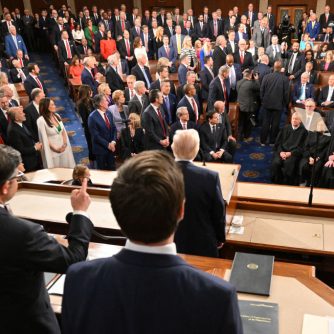In this episode of Carolina Newsmakers, host Don Curtis welcomes Elaine Marshall, who was recently reelected for an eighth term as North Carolina’s Secretary of State. With decades of service in the role, Marshall discusses the responsibilities of her office, the state’s business growth, consumer protection efforts, and the increasing impact of international economic relationships on North Carolina.
The Role of the Secretary of State
Marshall begins by clarifying a common misconception—unlike the U.S. Secretary of State, the North Carolina Secretary of State does not oversee elections. Instead, the office is primarily responsible for business infrastructure, economic development, and consumer protection. It serves as the registration hub for businesses, nonprofits, trademarks, and investment offerings while also enforcing regulations in key financial areas.
One of the office’s biggest roles is in business registration. Any company that wants to establish itself as an LLC, corporation, or nonprofit in North Carolina must go through the Secretary of State’s office. Marshall notes that North Carolina has experienced significant entrepreneurial growth, with new business formations rising by 63 percent since 2019. The peak was in 2021, with 178,000 new enterprises formed, averaging over 600 per business day.
Supporting Business Growth in North Carolina
Marshall discusses efforts to stimulate rural economic development, noting that while business creation is thriving in urban areas like Raleigh-Durham and Charlotte, rural areas face more challenges. To address this, her office launched the Resources for Innovators, Startups, and Entrepreneurs (RISE NC) initiative. This program provides small business owners with guidance, mentorship, and connections to local resources.
The Secretary of State’s office also handles trademark registrations, allowing North Carolina-based businesses to protect their brands at a state level for a lower cost and with a faster turnaround than federal trademarking. However, this protection only applies within state boundaries.
Protecting Consumers from Scams and Fraud
A major focus of the office is securities fraud prevention. The office regulates investment offerings to ensure they are legitimate and that North Carolina investors are not being defrauded. Marshall explains that her team investigates promoters and founders of investment opportunities, ensuring that they do not have fraudulent histories in other states.
Marshall highlights a growing problem known as pig butchering scams, a type of investment fraud often targeting seniors. These scams begin as friendly or romantic online interactions before shifting toward financial exploitation. Fraudsters lure victims in with promises of high returns, only to disappear with their money once they attempt to withdraw funds.
To combat financial fraud, the office encourages North Carolinians to verify investment opportunities through the state’s website before committing money. They also actively work with law enforcement to take down fraudulent websites and prosecute bad actors.
Addressing Counterfeit Goods and Trademark Violations
Marshall’s office also enforces trademark protections for both local and national companies. Recent efforts have focused on counterfeit consumer goods, including fake CBD gummies, electronics, and even pharmaceuticals. These counterfeit items not only hurt businesses but also pose public safety risks.
The vape industry has been a particular area of concern, as counterfeit vaping products containing unregulated substances have become common in North Carolina. Law enforcement and the Secretary of State’s office have conducted raids on stores selling these illicit products, uncovering links to organized crime and uncovering dangerous ingredients.
Notary Fraud and Real Estate Scams
With real estate transactions increasingly moving online, notary fraud and property scams have become pressing issues. Marshall explains that identity theft in real estate, including deed fraud and property squatting, has led to fraudulent sales of land and homes. Her office is working with local registers of deeds to implement alert systems that notify property owners if suspicious transactions are filed against their assets.
Electronic notarization is also becoming more common, which presents both opportunities and risks. The Secretary of State’s office is currently vetting vendors who provide remote notarization platforms to ensure that security and accuracy standards remain high.
International Economic Partnerships
As North Carolina becomes more globally connected, the Secretary of State’s office plays a growing role in international economic relations. Marshall describes how foreign governments, trade representatives, and ambassadors frequently visit her office to discuss investment opportunities in the state.
Recently, the office hosted the Consul General from the United Kingdom and is preparing to meet with the Romanian ambassador to discuss potential business partnerships. Foreign investment has become a major driver of North Carolina’s economy, with tens of thousands of jobs created by international businesses setting up operations in the state.
Preventing Charity Fraud and Lobbying Transparency
Another function of the Secretary of State’s office is charitable solicitation oversight. Any nonprofit raising funds in North Carolina must register with the office, allowing donors to verify their legitimacy. The website provides transparency by showing how much money raised by a charity actually goes toward its cause versus administrative costs.
Additionally, the office monitors lobbying activities, ensuring that registered lobbyists disclose their interactions with state lawmakers. However, Marshall expresses concern that lobbying laws in North Carolina have been weakened over the years, reducing transparency and making it harder for the public to track legislative influence.
Legislative Priorities and Future Plans
Looking ahead, Marshall is prioritizing rural business development, veteran entrepreneurship, and investment protections. She is also pushing for stronger regulations to prevent identity theft and financial fraud, particularly in cryptocurrency and online investments.
One ongoing concern is staffing and budget limitations. The office has had the same staffing levels for over a decade despite an increasing workload, and Marshall is requesting additional funding to hire more personnel to handle fraud investigations and business registrations.
With the North Carolina General Assembly in session, Marshall is keeping a close eye on legislation that could impact business regulations, investment laws, and transparency efforts. She emphasizes the importance of public vigilance in protecting personal and financial information, urging residents to report suspicious activity to her office.





